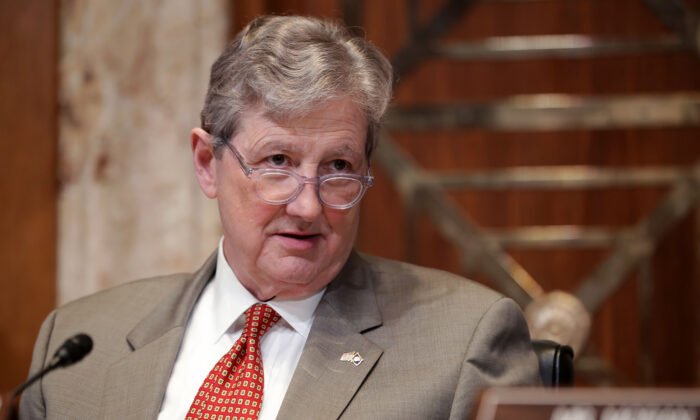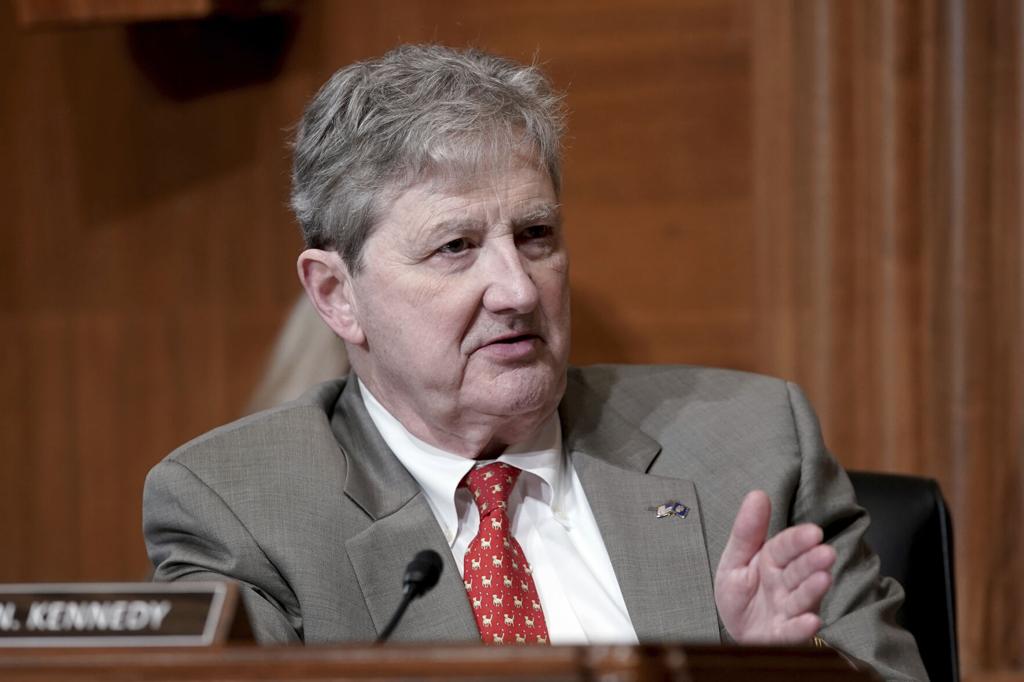
Washington has seen its share of scandals, but what happened in the Senate this week wasn’t just another round of partisan sparring. It was something raw, unscripted, and uncomfortably revealing — the kind of moment that slices through decades of polished rhetoric and exposes the machinery beneath.
At the heart of the storm stood Senator John Kennedy of Louisiana — the silver-haired statesman known for his Southern charm and razor-sharp tongue. But on this day, there was no humor, no folksy metaphors. Kennedy wasn’t joking. He was detonating something — and when the smoke cleared, the quiet in that chamber was more telling than the explosion itself.
The Moment Everything Changed
The Senate floor was supposed to host a routine hearing on government ethics — the kind of bureaucratic exercise that fills C-SPAN airtime but rarely fills headlines. Witnesses shuffled papers, senators rehearsed talking points, and staffers pretended to listen. But when Kennedy took the microphone, the air seemed to thicken.

He began slowly, almost conversationally.
“I’ve been here long enough to know that some truths are too inconvenient for polite company,” he said, eyes scanning the chamber. “But inconvenient truth is still truth.”
Then he turned toward the witness table — where a senior official from a powerful federal agency sat, visibly tense. Kennedy’s questions cut through the haze like lightning:
“When did public service become self-service? When did ideology replace integrity? And when did Washington decide that accountability was optional?”
Those questions weren’t rhetorical. They landed like blows. For the first time in years, the Senate room — a place built on predictable noise — fell into silence.
A Speech That Felt Like a Confession
Kennedy wasn’t reading from notes. He spoke like a man who’d carried something heavy for too long. He accused certain agencies of “moral blindness” — not corruption in the crude, financial sense, but something worse: the quiet decay of conscience.
“We’ve stopped asking if what we’re doing is right,” he said. “We only ask if it’s legal. And that’s how nations lose their soul.”
That line lingered. Reporters glanced up from their keyboards. Even the cameras seemed to pause.
Then came the bombshell. Kennedy hinted — without revealing names — that internal documents existed proving that federal agencies had collaborated with ideological think tanks to steer funding and policy decisions toward politically favored causes. Not illegal on paper, perhaps — but ethically radioactive.

“There are memos,” he said, voice low. “There are emails. And there are fingerprints on every one of them.”
The phrase sent a visible tremor through the room. The official sitting across from him shifted uneasily. The chairman tried to interrupt. Kennedy didn’t stop.
“You can bury evidence,” he continued, “but you can’t bury conscience.”
What He Exposed — and Why It Matters
To understand why Kennedy’s outburst mattered, you have to understand what he was really attacking. This wasn’t just about partisan hypocrisy or bureaucratic gamesmanship. It was about the moral foundation of governance — the belief that public institutions exist to serve the citizen, not to shape the citizen’s beliefs.
Over the last decade, politics in Washington has become increasingly ideological. Bureaucrats are no longer neutral managers of policy; they are seen — and often act — as enforcers of worldview. Kennedy’s charge was that this ideological creep has become systemic, infecting decisions from education grants to social policy to research funding.
“When government becomes a church,” he warned, “truth becomes heresy.”
That sentence hit like a sermon and a slap at once. For a moment, you could almost feel the weight of what he was saying: that America’s institutions — designed to balance power — had begun to blur the line between conviction and coercion.
The Moral Blind Spot
Kennedy’s broader argument was not about left or right — it was about moral blindness. He accused both parties of falling in love with their own virtue, of using morality as a mask for control.
“We lecture the people about justice while protecting our friends from it,” he said. “We speak of equality while hoarding privilege. And we call it leadership.”
That statement drew gasps. One senator whispered, “He’s gone too far.” But had he?
For years, Americans have watched scandals unfold — from insider trading to censorship controversies — and wondered whether anyone in Washington still believes in principle over politics. Kennedy’s speech felt like an answer to that doubt.
It wasn’t polished. It wasn’t safe. But it was true — at least in the way truth feels when it cuts too deep to ignore.
The Fallout Begins
By afternoon, Kennedy’s remarks had spread like wildfire. The clip was everywhere — on X, YouTube, Telegram, and the evening news. Hashtags like #KennedyExplosion and #SenateRevolt were trending within hours.
Fox News called it “a Senate shockwave.” MSNBC dismissed it as “political theater.” CNN described it as “a rare moment of unfiltered candor in a body addicted to pretense.”
Inside the Capitol, the reaction was more complicated. Several senators privately praised Kennedy’s courage while publicly avoiding comment. Others accused him of undermining trust in institutions. But even his critics admitted — off record — that something about his words resonated.
One veteran staffer told Politico:
“Kennedy didn’t just accuse people of corruption. He accused the entire system of moral exhaustion. And that’s what makes it dangerous — because he’s not wrong.”
Beyond the Headlines
Beneath the media noise, something deeper is happening. Kennedy’s speech tapped into a growing unease that transcends party lines — a sense that America’s institutions are no longer accountable to the people they serve.
For decades, Washington’s moral authority has rested on the illusion of self-correction — that oversight hearings, inspector generals, and bipartisan committees would keep corruption in check. But that system only works if truth still matters more than tribe.
And that’s the nerve Kennedy hit. His warning wasn’t just to bureaucrats. It was to everyone sitting in that chamber — and to the millions watching from home.
“You can’t fix a country you’re afraid to offend,” he said. “And you can’t defend freedom while you’re busy managing perception.”
It wasn’t a partisan speech. It was an existential one.
The Shadow That Remains
After Kennedy’s remarks, the chairman called for recess. No one moved. Senators stared at their desks. The witness wiped his brow. The air was heavy — not with outrage, but with recognition.
Even for those who disagreed, there was something haunting about the silence that followed. It was as if Kennedy had forced the Senate — and by extension, the nation — to look into a mirror it didn’t want to face.
When he finally stood to leave, he turned back and said quietly:
“If telling the truth feels like an explosion, maybe we’ve been living in a powder keg.”
And then he walked out.

The Reckoning Ahead
In the days since, investigative reporters have begun digging into the claims Kennedy hinted at. Whispers of leaked documents and undisclosed grants have surfaced. Congressional aides are scrambling to contain fallout. The White House, though careful, has reportedly requested briefings on what was said and whether evidence might surface.
This could fade as another news cycle flare — or it could ignite something larger: a reckoning not just with corruption, but with the soul of governance itself.
Because Kennedy’s outburst, for all its controversy, wasn’t just political performance. It was a reflection of something many Americans feel but few dare to say — that truth in Washington has become a performance art, and conscience a casualty of ambition.
And whether or not Kennedy’s documents exist, the moral question he raised cannot be unseen.
The Silence After the Explosion
Politics thrives on noise — but real change often begins in silence. After the cameras shut off and the reporters packed up, those who remained in the Senate chamber said the stillness was unsettling.
For once, the marble walls didn’t echo with partisanship — they echoed with guilt.
Kennedy may not have toppled an institution that day, but he exposed something no spin doctor can bury: the truth that power without humility eventually eats itself.
And as Washington wakes up to the aftershock of his words, one thought hangs heavy in the air —
something just exploded in the Senate.And this time, it wasn’t scandal.It was conscience, finally fighting back.
